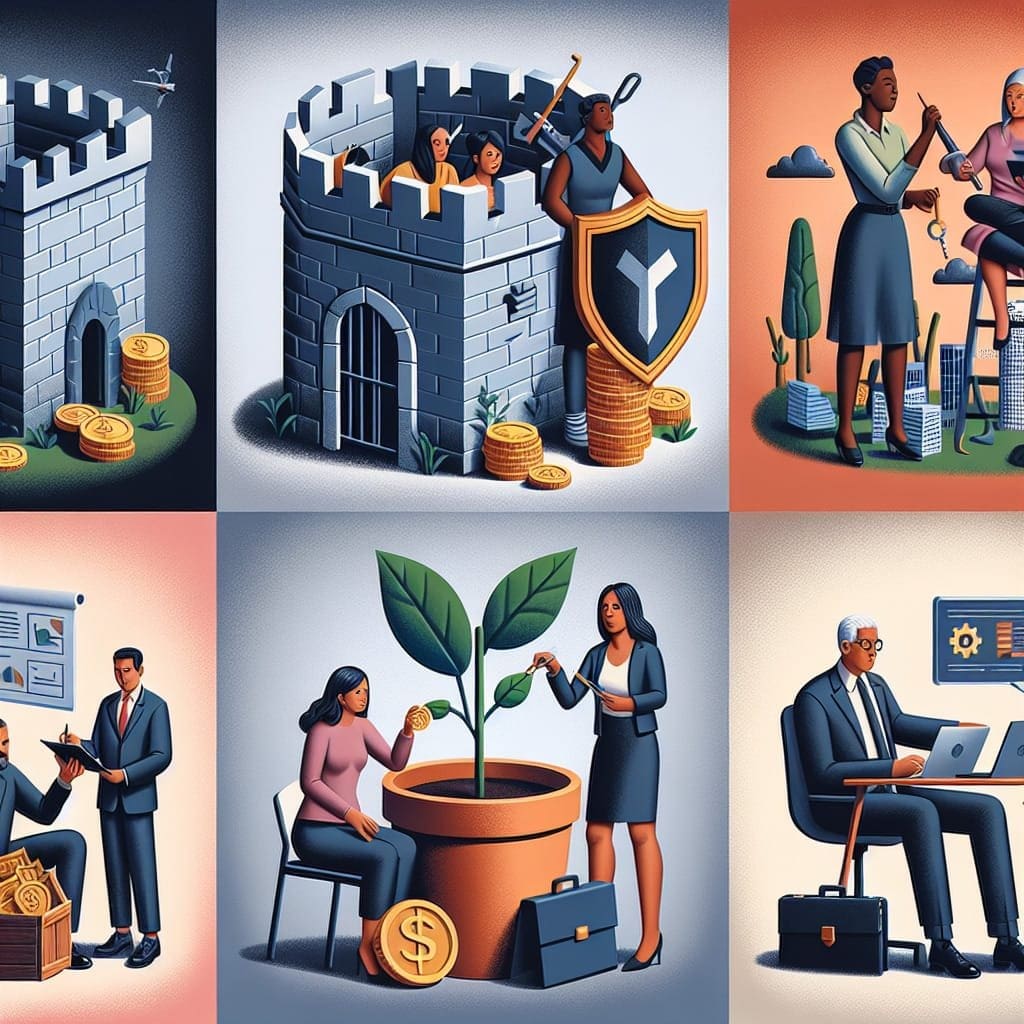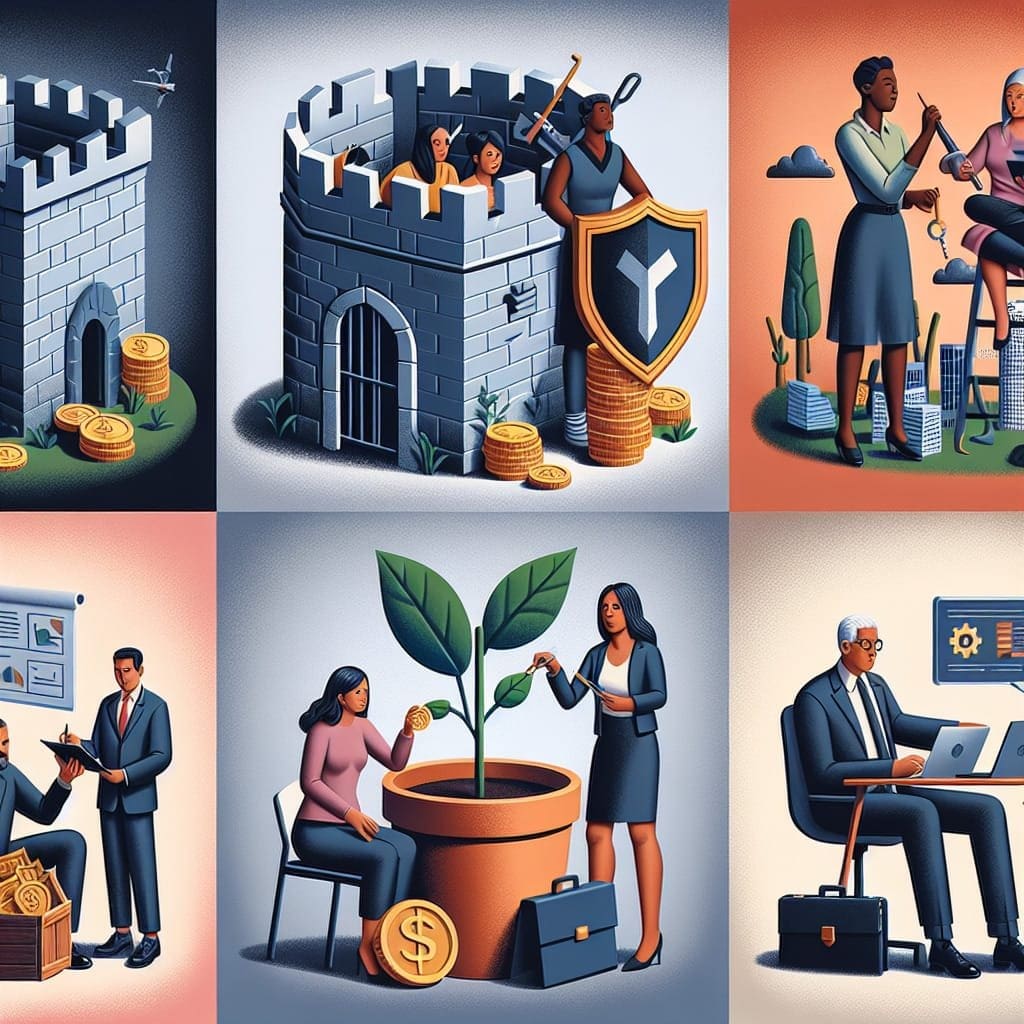Are you worried about the possibility of an economic crisis affecting you and your finances? Don't fret, because we've got you covered with the 5 essential steps to help you prepare for such a situation. In this article, you will discover practical tips and strategies that will not only cushion the blow of an economic downturn but also empower you to navigate through it with confidence. So, read on to learn how you can safeguard your financial future and stay afloat during challenging times.

Assessing your current financial situation
Assessing your current financial situation is the first step towards preparing for an economic crisis. It involves evaluating your income and expenses, reviewing your savings and investments, and assessing your debt and liabilities. By understanding your financial standing, you'll be able to make informed decisions and take necessary actions to protect your financial well-being.
Evaluate your income and expenses
Start by evaluating your income and expenses. Take a close look at your sources of income, such as your salary, freelance gigs, or any other revenue streams. Determine whether your income is stable or fluctuates and if there are any potential risks of reduction or loss. Then, analyze your expenses, including your fixed expenses like rent or mortgage payments, utilities, and insurance, as well as your discretionary expenses like eating out, entertainment, and shopping. This evaluation will help you identify areas where you can make adjustments to increase your savings and reduce unnecessary expenses.
Review your savings and investments
Next, review your savings and investments. Look at your savings accounts, certificates of deposit (CDs), and any other short-term liquid assets you have. Assess whether you have sufficient emergency savings that can cover your living expenses for at least three to six months. Additionally, evaluate your investments, such as stocks, bonds, real estate, and mutual funds. Consider the diversification of your portfolio and whether your investments are aligned with your risk tolerance and financial goals. This review will help you determine if any adjustments need to be made to better protect and grow your wealth.
Assess your debt and liabilities
Lastly, assess your debt and liabilities. Make a list of all your debts, including credit card balances, student loans, mortgage, and car loans. Calculate the total amount owing, the interest rates, and the minimum monthly payments for each debt. By understanding your debt obligations, you can identify any potential risks or challenges that may arise during an economic crisis. Explore strategies to manage and reduce your debt over time, such as consolidating high-interest debts or negotiating more favorable repayment terms. Assessing your debt and liabilities will give you a clearer picture of your financial obligations and allow you to make informed decisions moving forward.
Creating an emergency fund
Creating an emergency fund is crucial for weathering an economic crisis. An emergency fund acts as a financial safety net and provides you with a cushion against unexpected events or income disruptions. To create a robust emergency fund, follow these steps:
Setting a savings goal
Start by setting a savings goal for your emergency fund. Aim to save at least three to six months' worth of living expenses. Assess your current expenses and adjust them if needed. Track your progress regularly to stay on track and make adjustments if necessary. Having a specific savings goal will help you stay motivated and focused on building your emergency fund.
Establishing a budget
Establishing a budget is a key component of building an emergency fund. Create a detailed spending plan that includes your income, fixed expenses, discretionary expenses, and savings contributions. Track your expenses diligently and look for opportunities to cut back on unnecessary costs. By having a budget, you'll have better control over your finances, maximize your savings, and ensure consistent contributions to your emergency fund.
Building your emergency fund
Once you have set a savings goal and established a budget, it's time to start building your emergency fund. Allocate a specific portion of your income each month towards your savings goal. Consider automating your savings by setting up automatic transfers from your checking account to your emergency fund. This way, you won't be tempted to spend the money. Be patient and consistent with your savings efforts, and over time, you will have a well-established emergency fund to protect you during uncertain times.
Diversifying your income sources
Relying on a single source of income can leave you vulnerable during an economic crisis. To minimize this risk, it's essential to diversify your income sources. By having multiple streams of income, you'll have a more resilient financial foundation. Here's how you can diversify your income:
Identifying new income opportunities
Start by identifying new income opportunities that align with your skills, interests, and market demand. Consider looking for freelance or part-time work in your field of expertise. Explore online platforms that connect freelancers with potential clients. Evaluate the gig economy and consider whether you can offer your services or sell products online. Additionally, think about ways you can leverage your hobbies or passions to generate additional income. Brainstorm ideas and research potential opportunities to find the best fit for you.
Developing new skills or enhancing existing ones
To expand your income opportunities, focus on developing new skills or enhancing your existing ones. Assess what skills are in demand in the job market and identify areas where you can improve. Take online courses, attend workshops, or join professional development programs to gain new knowledge and expertise. By continuously upgrading your skills, you'll increase your value in the job market and open up new income possibilities.
Exploring passive income options
Passive income can provide a steady stream of money even during an economic crisis. Explore passive income options such as rental properties, dividend-paying stocks, or creating digital products. Passive income requires an initial investment of time and resources, but it can generate income with minimal ongoing effort. Evaluate your risk tolerance, time availability, and financial goals to determine the passive income strategies that are feasible and attractive for you.
Protecting your assets
Protecting your assets is essential during an economic crisis. By reviewing your insurance coverage, implementing asset protection strategies, and ensuring legal compliance, you can safeguard your wealth and minimize potential risks.
Reviewing insurance coverage
Start by reviewing your insurance coverage. Ensure that you have appropriate coverage for your home, car, health, and any other assets or liabilities you may have. Assess whether your coverage limits are sufficient and if there are any gaps in your policies. Consider adding umbrella insurance for additional liability protection. Regularly review and update your insurance policies to ensure they adequately cover all your assets and liabilities.
Implementing asset protection strategies
Implementing asset protection strategies can help shield your assets from potential risks. Consult with legal and financial professionals to explore options such as trusts, limited liability entities, and estate planning. These strategies can provide an additional layer of protection, ensuring that your assets are safeguarded during an economic crisis or in the event of unforeseen circumstances.
Ensuring legal compliance
Staying compliant with all relevant laws and regulations is crucial to protect your assets. Familiarize yourself with the legal requirements related to your business, investments, and personal financial matters. Seek guidance from legal professionals to ensure that you are operating within the legal framework. By staying compliant, you'll mitigate the risk of legal issues that can potentially impact your financial stability.

Reducing expenses and cutting costs
During an economic crisis, it's important to reduce expenses and cut costs wherever possible to protect your financial well-being. Here are some strategies to help you in this endeavor:
Performing a thorough expense analysis
Start by performing a thorough analysis of your expenses. Monitor your spending habits and identify areas where you can cut back. Look for recurring expenses that you can eliminate or reduce, such as monthly subscriptions or unnecessary memberships. Analyze your discretionary spending and prioritize essential purchases over non-essential ones. By understanding your expenses, you'll be able to make more informed decisions about where to cut costs.
Identifying discretionary expenses to eliminate
Identify discretionary expenses that you can eliminate or reduce. Evaluate your entertainment expenses, dining out, and non-essential shopping. Consider alternatives for expensive activities, such as finding free or low-cost alternatives for entertainment or implementing a meal planning system to reduce food expenses. By making conscious choices and cutting back on non-essential spending, you'll free up more money to save or invest, increasing your financial resilience.
Negotiating bills and reducing fixed costs
Negotiating bills and reducing fixed costs can lead to significant savings. Contact your service providers, such as phone, internet, or cable companies, to negotiate better rates or explore alternative plans. Consider refinancing your mortgage or consolidating high-interest debts to lower your monthly payments. Review your insurance policies and compare quotes to ensure you're getting the best rates. By taking the time to negotiate and explore cost-saving options, you can reduce your fixed expenses and redirect the savings towards your emergency fund or debt repayment.
Managing your debts
Managing your debts is crucial during an economic crisis to avoid financial strain and protect your creditworthiness. Follow these steps to effectively manage your debts:
Assessing your current debt status
Start by assessing your current debt status. Make a list of all your debts, including credit cards, loans, and outstanding balances. Determine the interest rates, minimum payments, and due dates for each debt. Calculate your total debt load and compare it to your income. Understanding your debt obligations will help you develop a strategy to tackle them effectively.
Developing a debt repayment plan
Once you have assessed your debt status, develop a debt repayment plan. Start by prioritizing your debts. Consider using either the debt avalanche method, where you focus on paying off debts with the highest interest rates first, or the debt snowball method, where you pay off debts with the smallest balances first. Choose the approach that aligns with your preferences and financial situation. Determine how much extra money you can allocate towards your debt payments each month and create a realistic timeline for debt repayment. Stick to the plan and make consistent payments to accelerate your debt payoff.
Negotiating with creditors
If you're experiencing financial hardship during an economic crisis, don't hesitate to reach out to your creditors. Contact them to discuss potential options for temporary relief or revised repayment plans. Many creditors offer hardship programs or forbearance options that can provide temporary relief from payments or lower interest rates. Be proactive in communicating with your creditors and seeking assistance when needed. This proactive approach can help you manage your debts effectively and protect your financial well-being.
Investing wisely
Investing wisely is crucial for long-term financial security, even during an economic crisis. Here are some key considerations for investing wisely:
Diversifying your investment portfolio
Diversifying your investment portfolio is a fundamental principle of wise investing. Spread your investments across different asset classes, such as stocks, bonds, real estate, and commodities. Within each asset class, diversify further by investing in different industries or sectors. This diversification helps mitigate risk, as different assets may perform differently during an economic crisis. Avoid putting all your eggs in one basket and regularly review and rebalance your portfolio to maintain diversification.
Reassessing risk tolerance
During an economic crisis, it's crucial to reassess your risk tolerance. Evaluate your comfort level with the ups and downs of the market and make any necessary adjustments to your investment strategy. Consider your investment horizon, financial goals, and overall financial situation. If you find that your risk tolerance has changed, consult with a financial advisor to realign your investment strategy accordingly. Maintaining a balanced approach that aligns with your risk tolerance is vital for long-term investment success.
Seeking professional financial advice
Seeking professional financial advice can provide valuable guidance during uncertain times. A financial advisor can help you assess your financial situation, develop an investment strategy, and navigate the complexities of the market. Look for a qualified and experienced financial advisor who understands your goals and has a fiduciary duty to act in your best interest. Regularly consult with your advisor to review your investments, make adjustments as necessary, and stay informed about market trends and developments.
Keeping informed about the economy
Staying informed about the economy is crucial for making sound financial decisions during an economic crisis. Here's how you can stay updated:
Staying updated on economic indicators
Stay updated on key economic indicators that can influence financial markets and the overall economy. Pay attention to indicators such as GDP growth, unemployment rate, inflation rate, consumer spending, and interest rates. Monitor these indicators regularly to gauge the health of the economy and identify potential risks or opportunities.
Following financial news and expert opinions
Follow financial news and expert opinions to gain insights into market trends, economic developments, and investment opportunities. Stay informed through reputable news sources, financial publications, and respected experts in the industry. However, be cautious of sensationalism or biased reporting. Seek multiple perspectives and conduct thorough research before making any financial decisions.
Monitoring government policies and regulations
Pay attention to government policies and regulations that can impact the economy and your personal financial situation. Keep track of fiscal and monetary policy changes, tax reforms, and government stimulus initiatives. Understand how these policies may affect your investments, taxes, or any financial assistance you're eligible for. Stay informed and adapt your strategies accordingly to maximize opportunities and mitigate risks.
Maintaining a positive mindset
Maintaining a positive mindset is crucial for navigating an economic crisis. Here are some ways to cultivate a positive attitude:
Practicing financial discipline and patience
Practice financial discipline and patience during an economic crisis. Stick to your budget, save diligently, and avoid impulsive spending. Remember that financial stability takes time and effort. Be patient with your progress and focus on the long-term goals you have set for yourself. Remind yourself that you are taking proactive steps to protect your financial future, and it will pay off in the long run.
Staying optimistic and proactive
Stay optimistic and proactive in the face of challenges. Rather than becoming overwhelmed by negative news or circumstances, focus on finding solutions and opportunities. Maintain a growth mindset and look for ways to adapt and evolve. Seek out positive stories and success stories to shift your mindset towards possibilities and resilience.
Seeking support from family and friends
During challenging times, it's essential to seek support from family and friends. Lean on your loved ones for emotional support, encouragement, and advice. Share your financial goals and concerns with them and engage in open and honest conversations about money. Remember that you're not alone in facing financial challenges, and collective support can help uplift your spirits and provide fresh perspectives.
Seeking professional assistance
During an economic crisis, seeking professional assistance can provide you with the guidance and support you need. Consider engaging with professionals in the following areas:
Consulting with a financial advisor
A financial advisor can provide personalized guidance and help you make informed financial decisions. They can assist with budgeting, saving, investing, and long-term financial planning. A financial advisor can assess your specific circumstances and recommend strategies tailored to your goals and risk tolerance. Consult with a reputable financial advisor to optimize your financial strategies and ensure you are on track towards your objectives.
Engaging with a career counselor
If you're concerned about the stability of your job or career during an economic crisis, consider engaging with a career counselor. They can help you evaluate your skills, explore new career opportunities, and navigate the job market. A career counselor can provide guidance on resume writing, interview skills, and professional development. They can help you adapt your skills and align your career with emerging industry trends.
Seeking professional help for mental health
An economic crisis can take a toll on your mental health. If you're experiencing excessive stress, anxiety, or depression related to your financial situation, seek professional help. Reach out to a mental health professional who specializes in financial issues or stress management. They can provide you with coping strategies, support, and resources to navigate the emotional impact of an economic crisis.
In conclusion, preparing for an economic crisis requires a comprehensive approach to protect your financial well-being. By assessing your current financial situation, creating an emergency fund, diversifying your income sources, protecting your assets, reducing expenses, managing your debts, investing wisely, staying informed about the economy, maintaining a positive mindset, and seeking professional assistance, you can better navigate financial challenges and safeguard your long-term financial stability. Stay proactive, keep learning, and remember that your financial future is in your hands.










